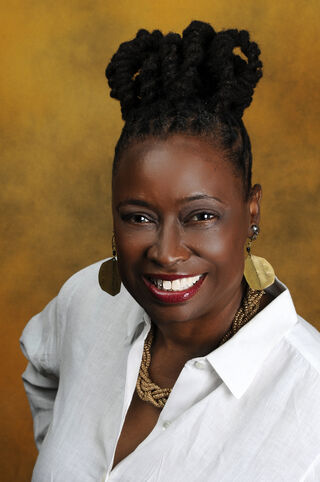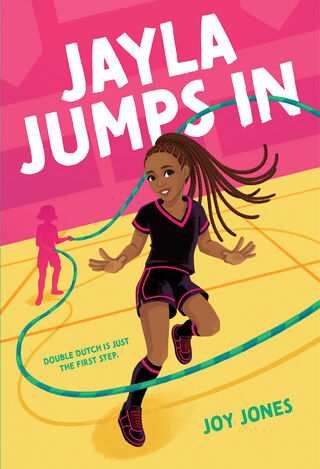Health
Finding Joy in Jump Rope ... And Russia
How the sport of double dutch took Joy Jones to unexpected places.
Posted September 22, 2020

Five years ago, I briefly interviewed Joy Jones for my post "23 Mental Health Professionals Interviewed About Their Jobs." At that time, she was a project director for a hospital’s creative expression program. The creative writing group she hosted for patients has been suspended due to the pandemic, but that hasn’t stopped Joy from accomplishing her own dreams. This month, her book Jayla Jumps In was released by Albert Whitman & Co.
The book, about an 11-year old African American girl discovering the challenging sport of Double Dutch, was inspired by Joy’s own adventures with jumping rope. In fact, at age 63, the sport found her hopping a flight to one of the most unlikely places during these strange political times.
I caught up with Joy to find out where she went, how it came to be, and how maintaining a spirit of “openness” made it all possible.
Where did you travel and how did that transpire?
Back in 2004, I founded DC Retro Jumpers, a double Dutch team for adults. After 11 years of leading the group, my enthusiasm had begun to wane. Then in 2017, a man happened to attend one of our events and amazed himself (and his wife, kids and friends) at being able to jump Double Dutch without any prior experience. It turned out he was a Washington Post reporter. He was so excited, he wrote a feature story about us. An arts impresario read the article and contacted me. “How would you like to be hired as cultural ambassadors to Russia?” she asked. Magically, my enthusiasm came back! And that’s how four black women, all over the age of 50, ended up in Russia teaching Double Dutch.
You told me you never would have imagined traveling to Russia. What was it like?
I imagined myself traveling, just not to Russia. By the time I had graduated from high school, I had already been to about seven or eight states and three countries. And I had plans of going to more places. Just not to Russia. Boris & Natasha. Trump & Putin. War & Peace. These were my primary reference points for Russia. But that’s the wonderful thing about travel it exposes you to real people, not to the stereotypes.
When I think of Russia and music, I think of the Nutcracker Suite. To be sure, ballet and classical music are big in Russia, but the handlers who arranged our tour were men in their twenties and thirties who were huge fans of hip-hop music and culture. I would not have predicted that Jay-Z would be as popular as Tchaikovsky.
Russians appreciate art. In Moscow and St. Petersburg, of course, but even in the small city of Belgorod, where the performance venues were elegant. Even the modest places showed that someone was mindful of aesthetics. The subway system in Washington, DC where I live is a sleek iron horse. The subway system in Moscow is utilitarian, too, but attention is given to artistic design. Some stations feature impressive columns or statues of cultural heroes; there’s a deliberate effort to make the system decorative as well as efficient.
And the people were welcoming. We got a warm reception wherever we went. They were unshrinking and up for adventure. Whenever we invited the audience to jump rope, they were game. We typically had long lines of people—old, young and in-between—eager to try this sport that most have never seen before and most certainly had never attempted.

How did the book come about?
I started Jayla Jumps In about a year before the trip to Russia and it took me about two years to write it. The idea for a book about Double Dutch wasn’t my idea. My agent would hear me talking about my various activities with the team and she suggested that I write a book for children. I dismissed the idea. As a writer, people are always approaching me and telling me what I should be writing about. Normally, for a book length manuscript, the concept is something I’ve been contemplating for a long time, sometimes years. However, when she suggested it a second time, I decided to play with the idea to see if it had legs. To my surprise, the writing wasn’t slow or labored, as it sometimes is for me. To my greater surprise, the first editor I approached liked it and bought it. Let me tell you, that’s seldom the way it happens.
Q: Describe Jayla Jumps In.
When you were a kid, did you ever find out something about a parent’s pre-you life that left you astounded? Then you know Jayla, who discovers that her mother once jumped Double Dutch, a sport Jayla had never heard of. It appears all the other grownups know how to do it but nobody wants to clue her in on this activity. In addition, she overhears talk that suggests her mother has a medical condition and nobody wants to come clean about that either. Combine that with other people in the family and at school who are good at getting on her nerves, Jayla has a few knots to untangle and Double Dutch proves to be the key to helping her figure things out and find her place in the family and the community.
Q: Looking back on discovering Double Dutch, traveling to Russia, and trailblazing an unconventional career path—adventures you said would have been hard to imagine when you were Jayla’s age—to what do you attribute all these accomplishments?
If you want to make God laugh, tell him your plans. Normally, that proverb is interpreted in a negative way—as a warning of how God will upset your good intentions. But God is capable of pleasant surprises, too.
Staying open to the way things want to work out as opposed to the way you want them to work out can lead to very unpredictable but gratifying outcomes. If I had been asked to list 100 places I'd like to see, Russia would not have made the cut. Now, I would eagerly go back for a second visit.
If I had been asked at age 10 if I expected to be jumping Double Dutch as a senior, I would have laughed in your face. If that same 10-year-old had been asked if she expected to become an author, I would have said, "But, of course." At an early age I knew I wanted to be a writer, but in my mind that meant being a novelist. I figured I'd meet that goal by age 30. Although I have written other things, it's taken until this advanced age to see the novel reach fruition.
For a good while, I also wanted to be a social worker. Once I decided on a degree in journalism, I assumed that I had closed the door on social work. However, the interest in mental health never went away. Continuing to read in the profession, volunteering in the field, and making friends in the business allowed me to stay in touch with that part of me.
As a result, my two career desires have complemented each other. My writing skills have landed me grants to do creative expression groups at St. Elizabeths Hospital, and my contacts with people in the mental health field led me to a previous job as the director of community relations at Psychiatric Institute of Washington.
My desire to spend a long, leisurely vacation on a Hawaiian isle hasn’t manifested and being on the bestseller list as a twenty-something will never happen. Nonetheless, the gifts that I have been given have been satisfying even if they’ve been unconventional or arrived in a circuitous way. While I’ve had focus, I’ve had to wear that focus like a loose garment to allow room for life to do its thing. Following the straight and narrow is not necessarily the path. The strange and twisted road is the journey most of us end of traveling. It’s a good journey.




